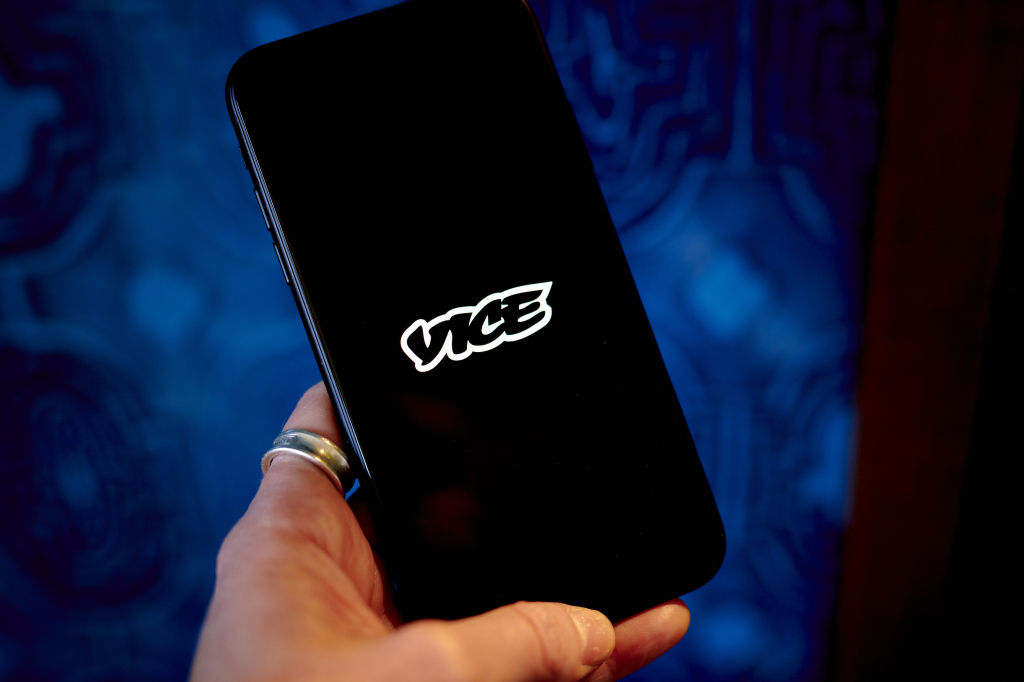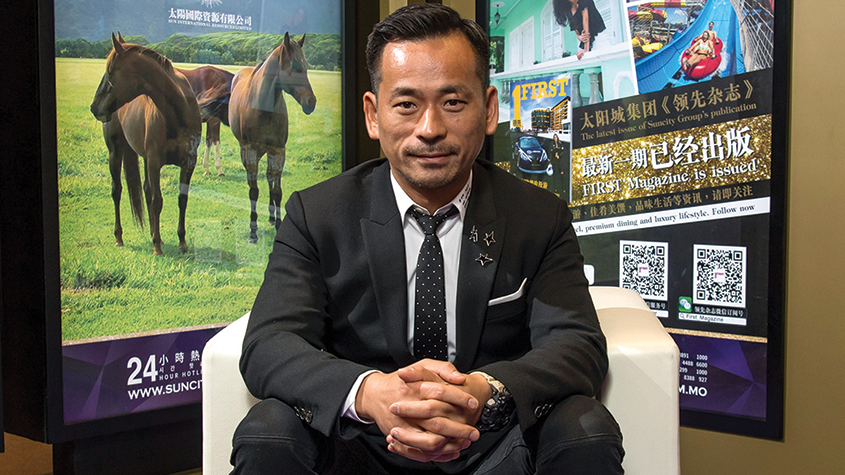Chris Xu: the retailer with a cult following
Chris Xu was born to poor farmers in the Shandong province of China. Today he leads a mysterious upstart that is unnerving established fast-fashion retailers. What’s his secret?

Get the latest financial news, insights and expert analysis from our award-winning MoneyWeek team, to help you understand what really matters when it comes to your finances.
You are now subscribed
Your newsletter sign-up was successful
Want to add more newsletters?

Twice daily
MoneyWeek
Get the latest financial news, insights and expert analysis from our award-winning MoneyWeek team, to help you understand what really matters when it comes to your finances.

Four times a week
Look After My Bills
Sign up to our free money-saving newsletter, filled with the latest news and expert advice to help you find the best tips and deals for managing your bills. Start saving today!
Few bosses of international companies are more enigmatic than Chris Xu, head of SHEIN (pronounced she-in) – the Chinese fast-fashion company that has been testing the mettle of established giants such as Zara and H&M on the back of explosive growth during the pandemic. As one analyst told CNN Business: “they’re making fast fashion look slow”.
What is disconcerting for incumbents is that this $50bn “mysterious upstart” appears to have come from nowhere, says CNN. SHEIN has succeeded in building “a cult following” among “a global army of teen fans on TikTok” – not just because it turns round the latest fashions at “hyper-fast” speed and sells them at bargain-basement prices, but because of its radically different model. Youthful shoppers are encouraged to check-in daily to win points “for everything from opening the app, to watching live streams and entering outfit design contests”. One describes the experience as like playing a mobile game, adding: “It is pretty addictive”.
Ghosts and shadows
SHEIN has been so disruptive – blowing previous disruptors such as Boohoo and ASOS out of the water – that everyone in the rag trade wants to know what makes it tick. Yet despite its heft, the ecommerce giant has a “ghostly PR presence”, says Charged Retail. One of Google’s most searched queries last year was: “Is SHEIN a legit company?” Indeed, until quite recently, many were convinced that its shadowy founder may not actually be Chinese at all. In 2021, no less an authority than Forbes had Chris Xu pegged as “an American-born graduate of Washington University”.
MoneyWeek
Subscribe to MoneyWeek today and get your first six magazine issues absolutely FREE

Sign up to Money Morning
Don't miss the latest investment and personal finances news, market analysis, plus money-saving tips with our free twice-daily newsletter
Don't miss the latest investment and personal finances news, market analysis, plus money-saving tips with our free twice-daily newsletter
The reality is rather different. Local Chinese media report that he was born as Xu Yangtian in 1984 in Zibo in the Shandong province, the son of poor farmers. The family deemed education important and Xu worked his way through high school, winning a place to study international trade at the Qingdao University of Science and Technology, while continuing to work part-time. His big break was getting a job in charge of search-engine optimisation (SEO) at a company in Nanjing that claimed to be China’s “first cross-border ecommerce marketing service provider”. In 2008, he quit to form his own company, Nanjing Dianwei Information Technology, with two partners.
At first the trio traded pretty much anything, says Wired: hawking cheap Chinese-made goods, from teapots to mobile phones, to international buyers. But by 2009 – apparently inspired by his fiancée’s hunt for a wedding dress – Xu had decided to major in apparel. His partners reportedly didn’t agree with the idea and were shocked to arrive in the office one day to discover that Xu had done a flit – having changed some company passwords and, they alleged, retained control of its PayPal accounts. (A SHEIN spokesman disputed these allegations to Wired and said Xu and his partners “separated peacefully”.)
A mob of influencers
In 2011, Xu registered the website that would eventually become SHEIN, calling itself “a leading worldwide wedding dresses company”, but within a year it had broadened into street fashion. According to CB Insights, the company raised its first round of venture-capital funding in 2013 from JAFCO Asia, following that up with a $47m investment in 2015, when it moved its Chinese HQ to Guangzhou to be closer to its supplier-base, and “quietly opened” a US HQ near LA. By 2019, Coresight Research estimated SHEIN was turning over $4bn – a figure that quickly multiplied when the lockdowns hit.
These days, both Xu and his company are reportedly based in Singapore, says The Street – a choice aimed at making “a US listing easier”. But despite rumours of an imminent initial public offering, it has repeatedly been shelved. Meanwhile, SHEIN’s only public face continues to be “a federation of influencers”, filming their “hauls” of cheap clobber, says CNN.
Can SHEIN continue its explosive growth out of the spotlight? The jury’s out, says Wired. Some analysts admit they can’t get their heads around how it makes its numbers stack up; others claim its “ultra-low prices are hiding unacceptable costs” in terms of exploitation of workers and the environment, not to mention potential copyright litigation. As Credit Suisse points out in a research note, it is “highly likely” that US lawmakers will try to rein in fast-fashion – and that “SHEIN in particular will struggle to comply”. Whether he likes it or not, the firm’s mysterious founder may soon find himself in the spotlight.
Get the latest financial news, insights and expert analysis from our award-winning MoneyWeek team, to help you understand what really matters when it comes to your finances.
Jane writes profiles for MoneyWeek and is city editor of The Week. A former British Society of Magazine Editors (BSME) editor of the year, she cut her teeth in journalism editing The Daily Telegraph’s Letters page and writing gossip for the London Evening Standard – while contributing to a kaleidoscopic range of business magazines including Personnel Today, Edge, Microscope, Computing, PC Business World, and Business & Finance.
-
 How a ‘great view’ from your home can boost its value by 35%
How a ‘great view’ from your home can boost its value by 35%A house that comes with a picturesque backdrop could add tens of thousands of pounds to its asking price – but how does each region compare?
-
 What is a care fees annuity and how much does it cost?
What is a care fees annuity and how much does it cost?How we will be cared for in our later years – and how much we are willing to pay for it – are conversations best had as early as possible. One option to cover the cost is a care fees annuity. We look at the pros and cons.
-
 VICE bankruptcy: how did it happen?
VICE bankruptcy: how did it happen?Was the VICE bankruptcy inevitable? We look into how the once multibillion-dollar came crashing down.
-
 What is Warren Buffett’s net worth?
What is Warren Buffett’s net worth?Warren Buffett, sometimes referred to as the “Oracle of Omaha”, is considered one of the most successful investors of all time. How did he make his billions?
-
 Kwasi Kwarteng: the leading light of the Tory right
Kwasi Kwarteng: the leading light of the Tory rightProfiles Kwasi Kwarteng, who studied 17th-century currency policy for his doctoral thesis, has always had a keen interest in economic crises. Now he is in one of his own making
-
 Yvon Chouinard: The billionaire “dirtbag” who's giving it all away
Yvon Chouinard: The billionaire “dirtbag” who's giving it all awayProfiles Outdoor-equipment retailer Yvon Chouinard is the latest in a line of rich benefactors to shun personal aggrandisement in favour of worthy causes.
-
 Johann Rupert: the Warren Buffett of luxury goods
Johann Rupert: the Warren Buffett of luxury goodsProfiles Johann Rupert, the presiding boss of Swiss luxury group Richemont, has seen off a challenge to his authority by a hedge fund. But his trials are not over yet.
-
 Profile: the fall of Alvin Chau, Macau’s junket king
Profile: the fall of Alvin Chau, Macau’s junket kingProfiles Alvin Chau made a fortune catering for Chinese gamblers as the authorities turned a blind eye. Now he’s on trial for illegal cross-border gambling, fraud and money laundering.
-
 Ryan Cohen: the “meme king” who sparked a frenzy
Ryan Cohen: the “meme king” who sparked a frenzyProfiles Ryan Cohen was credited with saving a clapped-out videogames retailer with little more than a knack for whipping up a social-media storm. But his latest intervention has backfired.
-
 The rise of Gautam Adani, Asia’s richest man
The rise of Gautam Adani, Asia’s richest manProfiles India’s Gautam Adani started working life as an exporter and hit the big time when he moved into infrastructure. Political connections have been useful – but are a double-edged sword.